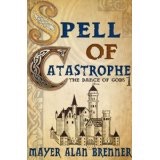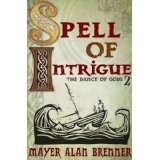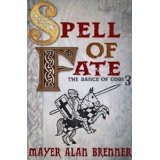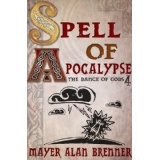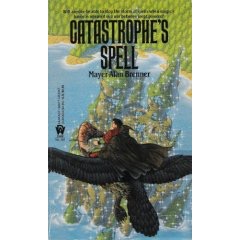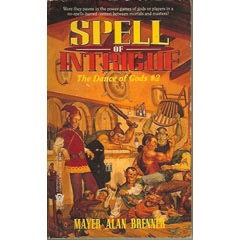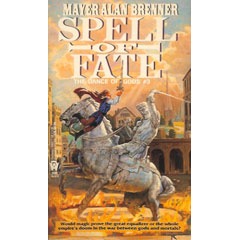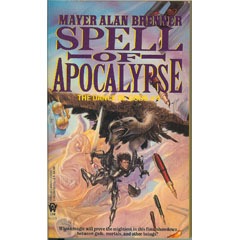I don't recall if anyone had tried a hard-boiled detective pastiche in a fantasy context before, but whether I'd read one or not, it was clearly an idea whose time was ready, most prominently with the arrival of Glen Cook













But this character, and this chapter, originally started as a standalone exercise with the prototype being the Continental Op






Even though the Op was the springboard in this chapter, though, things began to diverge for me fairly quickly, especially when I started to wonder what relationship he might with Max, Shaa, and the rest. And then there was one of these hugely satisfying "a-hah!" moments, represented later in Catastrophe, where a vast swath of the entire series became clear all at once, and where I realized what was inherent not only in my version of the character but the original Op as well. (A moment, please, while the author rubs his hands maniacally in decades-gone remembered glee.)
The beginning of this chapter also holds the one change I made to have the manuscript accepted by an agent. My earlier novel, for various historical reasons, had gone through the publisher slush piles, had been almost accepted several times, had been dramatically rewritten twice on specific editorial request, and had ultimately landed back at my house doing doorstop duty. With Catastrophe, I decided that if I couldn't get an agent I'd rethink the whole enterprise. So off went the letters of inquiry, off went the copied manuscript, to agents of friends, agents to whom I had introductions, agents from lists, the whole traditional deal. Except for one. I had been warned in no uncertain terms away from the Scott Meredith Literary Agency.
At the time, Scott Meredith was one of the biggest and oldest names in science fiction. However, in the 1980s the company had instituted a reading fee for unsolicited manuscripts. This meant, of course, that the agency was now in the business of reading manuscripts, not necessarily picking those that could be sold for publication. Although they had to occasionally pluck a work from the pile and represent the author, this clearly was not happening very often. Paying a reading fee was considered to be uncomfortably close to paying a vanity press for actually publishing your book.
So as I said, I kept away from Scott Meredith, and went through everyone else I could find.
I got back very few out-and-out negative responses. There were the ones that didn't handle that sort of thing, the ones that were full right now, the whole typical and boring lot. The most interesting was perhaps the agent who liked it a lot - a lot! - and all I would have to do was cut to about half the length, eliminate most of the overlapping characters and the interweaving plot, and pick a single viewpoint character.
My other options ran slim and then ran out. I gulped and sent Scott Meredith the book, with the reading fee. About three weeks later, I received a letter back.
Joshua Bilmes, a young agent somewhere deep in the vast teeming workhouse that was Scott Meredith, no doubt manacled to his high script-board in a squalid vision torn from the memories of Dickens' London (or perhaps the vision came from the genre's race memory of Street and Smith's huge block-long print and editorial behemoth) had offered on behalf of Scott Meredith to represent the book ... if one important matter could be resolved. Visions of "cut by half" and "eliminate all characters" swimming in my fevered brain, I still was able to ultimately comprehend the magnitude of the matter in question - and it could be big, or it could be small. I preferred small. The second sentence of the first paragraph of Chapter 2 was the answer, along with some minor adjustments surrounding it.
The problem was that the reader assumed that the first-person narrator of Chapter 2 was Max, and it seemed to take a little too long to escape that misconception. Adding the second sentence resolved the matter well enough that no more was ever said.
Actually, to tell the truth, I was never wholly satisfied with the addition, short as it is. While it may have been justified twenty years ago, I'm not so sure it's necessary now, given how much more readers have become accustomed to teeming myriads of characters interacting in cunning ways. If readers have become more comfortable with delayed gratification, telegraphing right from the start that the characters will overlap gives away something that perhaps should remain an organic outgrowth of the plot. Unless I receive a huge outpouring of sentiment to the contrary, though, I think it might as well remain.
